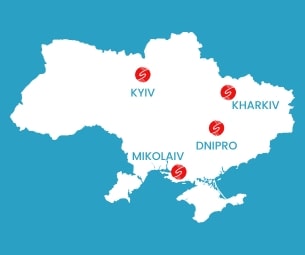
Context
Vast areas of the country and some of its essential infrastructure have been damaged or destroyed by air strikes and ground fighting. The human consequences have been considerable, with many casualties, injuries and millions of people forced to flee.
The advance of the Russian army has led to massive population movements, with up to 5.9 million people displaced within Ukraine and 7.9 million refugees outside the country by September 2022.
In 2023, although the war persists, the front line is now stable and displacements have fallen considerably. At the same time, a large number of returns have been recorded since the Ukrainian counter-offensive of 2022, particularly from the west to the east of the country and especially in the Kharkiv Oblast, which has seen the greatest demographic fluctuation.
In this evolving context, needs are changing and it is therefore necessary to adapt humanitarian assistance to ensure that it remains as relevant as possible. With fewer displaced people, part of the budget previously devoted to their assistance is being redirected towards providing more assistance to villages close to conflict zones. This reorientation makes it possible to provide both emergency and rehabilitation assistance, for example by rehabilitating damaged or ageing structures, with the aim of creating conditions conducive to a dignified return for people who have been displaced.
At present, the Ukrainian population is particularly vulnerable to winter conditions, due to the climate and the severely damaged or even destroyed energy infrastructure in the regions close to the front line. The main request for assistance concerns preparing the population to cope with the rigours of winter.
- 37 million inhabitants
- 77th out of 191 countries on the Human Development Index
Our action

-
Mission
opened in 2022 -
Team
31 international staff
91 national staff - Budget 18M€
SOLIDARITÉS INTERNATIONAL’s strategy in Ukraine is based on 2 pillars.
Firstly, SOLIDARITÉS INTERNATIONAL intervenes in areas directly affected by the fighting, close to the front line or newly liberated. This intervention is carried out directly or through local partners, using an integrated and flexible approach.
Interventions are multi-sectoral and aim to :
- provide support for essential items in areas where markets are not functional
- to provide affected communities with access to drinking water by rehabilitating damaged water networks, transporting water by truck and distributing bottled water
- help people affected by the conflict to keep warm
- where possible (functional markets), assistance involves the distribution of money to enable beneficiaries to cover their basic needs.
Secondly, SOLIDARITÉS INTERNATIONAL is helping to build individual and structural resilience in the medium term and is helping to improve living conditions in areas that have been sustainably and recently liberated.
The interventions, which are also multi-sectoral, aim to :
- rehabilitate the water supply networks;
- to provide support to the local population for the rehabilitation of housing damaged or destroyed by conflict or occupation by the Russian army
- to provide financial assistance to help people consolidate their livelihoods
- where possible (functional markets), assistance involves the distribution of money to cover the medium-term needs of individual and structural resilience.
BHA, ECHO, CDCS, Fondation Abbé Pierre, Decathlon, Artelia, Fondation Veolia
Our impact

Water, sanitation and hygiene
- Construction and rehabilitation of water supply facilities
- Construction of latrines for community centres
- Distribution of emergency and travel hygiene kits
- Construction and repair of water, hygiene and sanitation infrastructure in community centres
- Setting up mobile water treatment plants

Shelters
- Supply of shelter kits to people on the move
- Rehabilitation at household level of houses destroyed by bombing or Russian occupation in the newly liberated territories.
- Distribution of cash for repairs to households destroyed by bombing or Russian occupation in the newly liberated territories.

Preparing for winter
- Supply of solid fuels to households
- Supply of insulation kits to households vulnerable to winter conditions
- Distribution of kits of essential winter items including mattresses, sleeping bags, blankets, quilts, thermos flasks, winter clothing sets, etc. as recommended by the Shelter Cluster.
- Distribution of cash to enable households to purchase essential winter items
Should you have any questions, please contact Xavier Lauth

Vacancies
At head office
Worldwide
Internships
